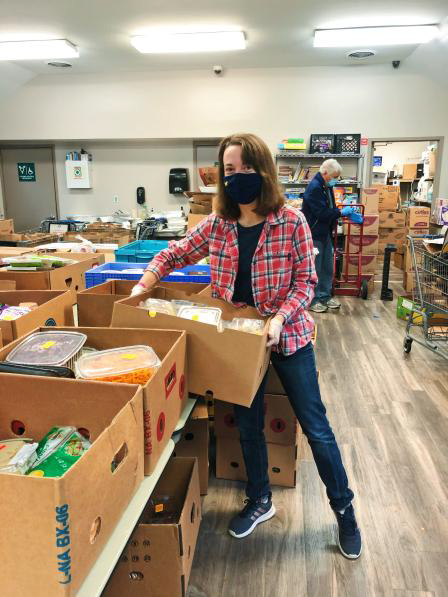

Volunteers prepare food at one of Food Gatherers’ 170 partner programs. | Photo by Community Action Network
By RACHEL RABIDEAU
Staff Writer
Battling COVID-19 has been a struggle. During quarantine, many have been unable to work and had no source of income.
College students especially rely on lower-wage jobs that may not be available remotely. While some are able to live with their parents, others have already been tied into their leases, bleeding them of money that they don’t have.
About 26 percent of undergraduates said they lost wages from an off-campus job, and 18 percent lost wages from a campus job, according to a national survey conducted in the fall. Almost one-third of students have experienced food insecurity since the beginning of the pandemic.
As programs such as WCC’s Emergency Food Pantry shut down, students needed other places to turn to.
Food Gatherers is an organization dedicated to helping low-income adults, seniors, and children in Washtenaw County get direct food assistance. It provides food to about 170 nonprofits and food programs across the county and has been working hard to pick up the pace in the midst of hardship.
“There are about 55,000 food-insecure households in Washtenaw County alone,” said Helen Starman, chief development officer at Food Gatherers. She said food insecurity on college campuses was already steadily increasing pre-pandemic but has gone up “30 to 40 percent since COVID.”
“There are different types of food insecurities,” said Starman. Some people can afford food, but not healthy food. They have other expenses that they need to prioritize. “Rent is a constant cost. To some extent, so is gas for going to work,” she said. “Food is more flexible, so it’s easy to go to cheap alternatives, like Ramen.”
Food Gatherers strives to ensure that at least 60% of the food it provides is fresh produce and protein. By providing the more expensive types of foods, people in food-insecure households can then use food stamps or budget for the rest of their diet. Starman said, “some [pantries] support a religious diet, like kosher…or medical diets, like gluten-free or low-sugar options.”
According to “What it Looks Like to be Hungry in College” by Dante Barboy, students’ academic performances suffer when they experience food insecurity. Students “reported losing sleep, eating poorly, and becoming ill,” said Barboy. Because college students have to allocate a certain amount of time to attending class and studying, many students “quit their jobs while others were let go.” This worsens their financial situation, making food even harder to come by.
If you are one of the 13.6 percent of Washtenaw County residents living in a food-insecure household, Food Gatherers and its partners make it easy to get food. Some food pantries are open several days a week for those in need, whereas others are open less frequently. To find a location near you, call or go to Food Gatherer’s website. You don’t need to disclose any personal information to participate — all you need to do is show up and your food pantry will help you get contact-free meals.
Post-COVID, food pantries have pre-packaged emergency food packages that are distributed safely. Some locations even include a new delivery service.
According to Starman, there has been an increase in need due to COVID-19. If you’re able to contribute, Food Gatherers is still taking both food drives and monetary donations. The money that is donated to them can be used for the numerous costs they take on from distributing free food as well as toward buying food.
Below are recent employment want ads that have been posted with WCC Center for Career…
Zakeria Almajrabi | Photo and Writing Contributor TEDxWCC is an annual event hosted towards the…
Some policies under review amid federal changes Lily Cole | Editor ONGOING COVERAGE At the…
5 first place honors received, including general excellence Alice McGuire | Deputy Editor On April…
Possible cuts, addition to be discussed at next meeting Yana McGuire | Staff Writer WCC’s…
Zachary Cleveland | Contributor Upwards of 1,500 Washtenaw County residents gathered under a chilly grey…